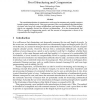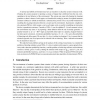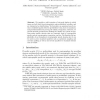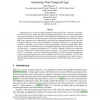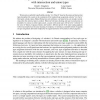108
Voted
LPAR
2010
Springer
15 years 16 days ago
2010
Springer
Abstract. Jer
82
Voted
LPAR
2010
Springer
15 years 16 days ago
2010
Springer
118
Voted
LPAR
2010
Springer
15 years 16 days ago
2010
Springer
A rational and selfish environment may have an incentive to cheat the system it interacts with. Cheating the system amounts to reporting a stream of inputs that is different from ...
126
Voted
LPAR
2010
Springer
15 years 16 days ago
2010
Springer
We consider a mild extension of universal algebra in which terms are built both from deterministic and probabilistic variables, and are interpreted as distributions. We formulate a...
121
Voted
LPAR
2010
Springer
15 years 16 days ago
2010
Springer
145
Voted
LPAR
2010
Springer
15 years 16 days ago
2010
Springer
We present an explicitly typed lambda calculus "`a la Church" based on the union and intersection types discipline; this system is the counterpart of the standard type a...
138
Voted
LPAR
2010
Springer
15 years 16 days ago
2010
Springer
Pointer analysis statically approximates the heap pointer structure during a program execution in order to track heap objects or to establish alias relations between references, a...
126
Voted
LPAR
2010
Springer
15 years 16 days ago
2010
Springer
We present a sound and complete model of lambda-calculus reductions based on structures inspired by modal logic (closely related to Kripke structures). Accordingly we can construct...
112
Voted
LPAR
2010
Springer
15 years 16 days ago
2010
Springer
Abstract. A meta-program is a program that generates or manipulates another program; in homogeneous meta-programming, a program may generate new parts of, or manipulate, itself. Me...

